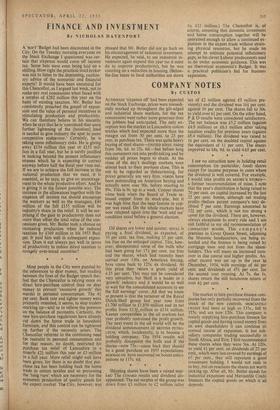FINANCE AND INVESTMENT
By NICHOLAS DAVENPORT
A 'SOFT' Budget had been discounted in the City. On the Tuesday morning everyone on the Stock Exchange I questioned was cer- tain that sixpence would come off income tax. Some bets were even being laid on a shilling. How right the practical stockbroker was not to listen to the depressing, caution- ary advice of the economic and financial experts! It would have been unnatural for this Chancellor, as I argued last week, not to make any real concessions when faced with a surplus of £282 million this year on the basis of existing taxation. Mr. Butler has consistently preached the gospel of expan- sion and the value of personal incentives in stimulating production and productivity. We can therefore believe in his sincerity when he says that he is 'convinced that some further lightening of the [taxation] load is needed to give industry the spur to more competitive endeavour.' Certainly, he is taking some inflationary risks. He is giving away £134 million this year or £155 mil- lion in a full year, but he is surely justified in looking beyond the present inflationary stresses which he is expecting to correct anyway before half the fiscal year runs out. If we are to achieve the full increase in the national production that we need, it is essential, as he says, to give an encourage- ment to the whole productive effort. And he is giving it in the fairest possible way. The increase in the allowances together with the sixpence off income tax should encourage the workers as well as the managers. £40 million of the full £155 million will be industry's share in the relief. It will be sur- prising if the gain to productivity does not more than offset the total value of the con- cessions given. Mr. Butler took a chance on increasing production when he reduced taxation by £169 million in his 1953 Bud- get. It paid him well in subsequent expan- sion. Does it not always pay well in terms of productivity to reduce direct taxation in savagely over-taxed countries?
Most people in the City were puzzled by the references to dear money, but reading between the lines of the Budget speech they feel that the Chancellor is relying more on direct hire-purchase control than on dear money to prevent .'excessive growth' (his words) in personal consumption. The 41 per cent. Bank rate and tighter money were primarily intended, it seems, to stop traders stocking up—and so to relieve the pressure on the balance of payments. Certainly, the new hire-purchase regulations have already cut down the home trade in household furniture, and this control can be tightened up further if the necessity arises. The Chancellor referred to the continuing need for restraint in personal consumption and for that reason, no doubt, restricted his purchase tax relief of Lancashire to a miserly £2+ million this year or £3 million in a full year. More relief might well have been given, for there is no doubt that pur- chase tax has been holding back the home trade in cotton textiles and so preventing the long runs' which are necessary for the economic production of quality goods for the export market. The City, however, was pleased that Mr. Butler did not go back on his encouragement of industrial investment. He expected, he said, to see industrial in- vestment again expand this year (as it must do to improve productivity), but he was counting on a reduction in housing. (Below- the-line loans to local authorities are down by £33 million.) The Chancellor is, of course, assuming that domestic investment and home consumption together will be restrained enough to allow a continued ex- pansion in the export trade without strain- ing physical resources, but he made no attempt to estimate potential inflationary gaps, as his clever Labour predecessors used to do under economic guidance. This was no theoretical economist's Budget. It was a practical politician's bid for business expansion.










































 Previous page
Previous page